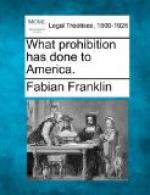prestige of the central government are bound to grow,
the power and prestige of the State governments are
bound to decline, under the pressure of economic necessity
and social convenience; all the more, then, does it
behoove us to sustain those essentials of State authority
which are not comprised within the domain of those
overmastering economic forces. If we do not hold
the line where the line can be held, we give up the
cause altogether; and it will be only a question of
time when we shall have drifted into complete subjection
to a centralized government, and State boundaries will
have no more serious significance than county boundaries
have now. But if there is one thing in the wide
world the control of which naturally and preeminently
belongs to the individual State and not to the central
government at Washington, that thing is the personal
conduct and habits of the people of the State.
If it is right and proper that the people of New York
or Illinois or Maryland shall be subjected to a national
law which declares what they may or may not eat or
drink—a law which they cannot themselves
alter, no matter how strongly they may desire it—then
there is no act of centralization whatsoever which
can be justly objected to as an act of centralization.
The Prohibition Amendment is not merely an impairment
of the principle of self-government of the States;
it constitutes an absolute abandonment of that principle.
This does not mean, of course, an immediate abandonment
of the practice of State self-government; established
institutions have a tenacious life, and moreover there
are a thousand practical advantages in State selfgovernment
which nobody will think of giving up. But the
principle, I repeat, is abandoned altogether if we
accept the Eighteenth Amendment as right and proper;
and if anybody imagines that the abandonment of the
principle is of no practical consequence, he is woefully
deluded. So long as the principle is held in
esteem, it is always possible to make a stout fight
against any particular encroachment upon State authority;
any proposed encroachment must prove its claim to
acceptance not only as a practical desideratum but
as not too flagrant an invasion of State prerogatives.
But with the Eighteenth Amendment accepted as a proper
part of our system, it will be impossible to object
to any invasion as more flagrant than that to which
the nation has already given its approval. A
striking illustration of this has, curiously enough,
been furnished in the brief time that has passed since
the adoption or the eighteenth Amendment. Southern
Senators and Representatives and Legislaturemen who,
for getting all about their cherished doctrine of
State rights, had fallen over themselves in their eagerness
to fasten the Eighteenth Amendment upon the country,
suddenly discovered that they were deeply devoted
to that doctrine when the Nineteenth Amendment came
up for consideration. But nobody would listen
to them. They professed—and doubtless




